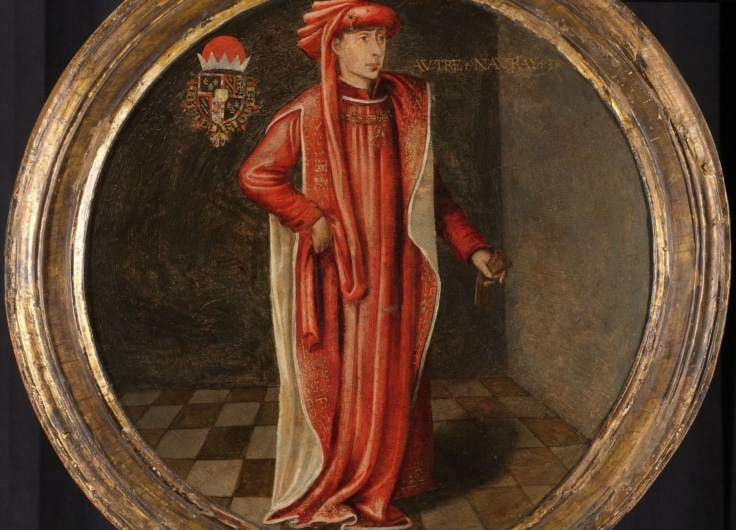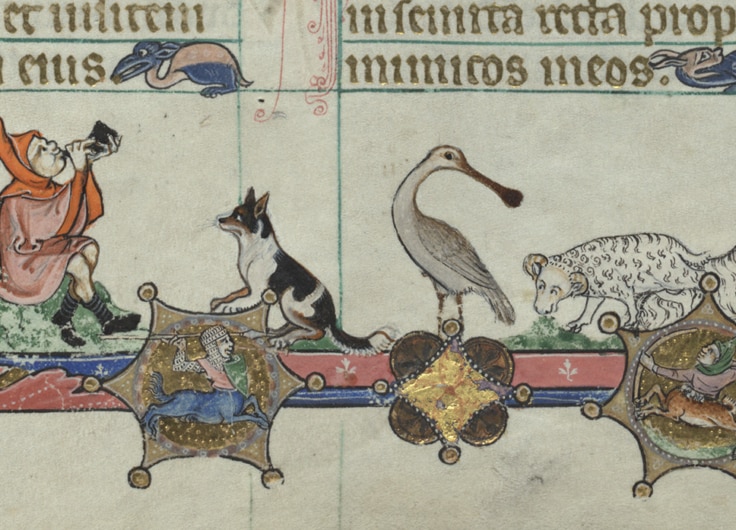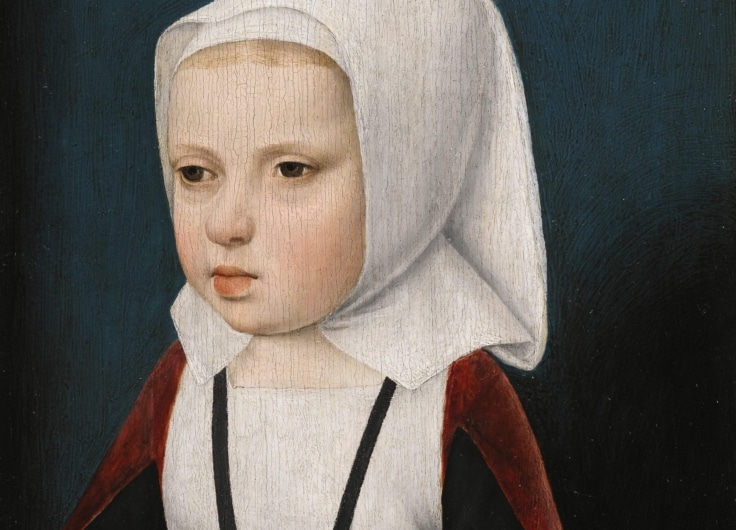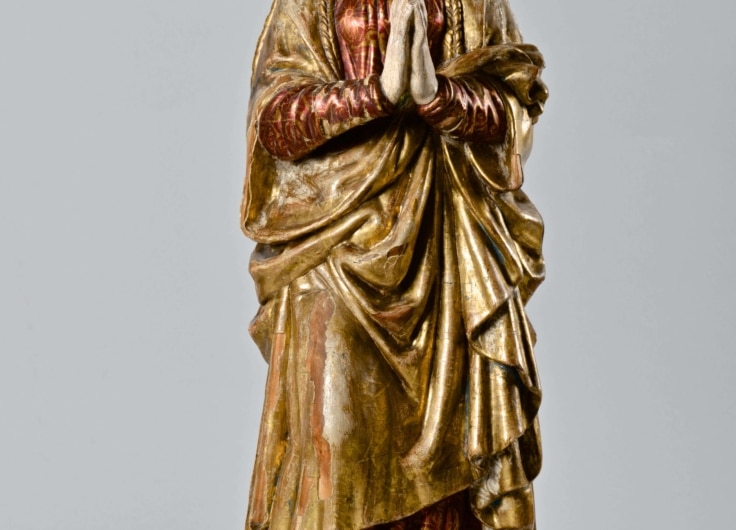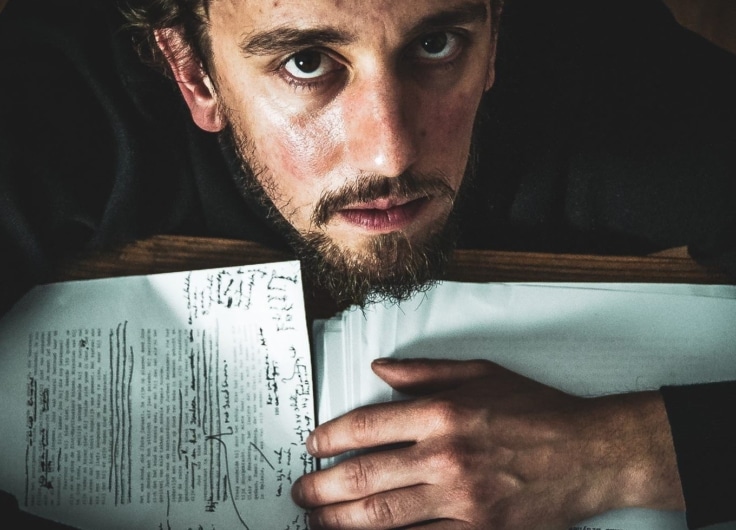Despite his adventurous epithet, Philip the Bold made more use of diplomacy than the sword. By the end of the 14th century, the Duke of Burgundy was able to bring a modicum of stability to rebellious Flanders and begin centralising power in the Low Countries under a single ruler: himself and his successors. Philip created what would go down in history as the Burgundian Netherlands, and a dynasty that would change the Low Countries forever.
During his rule as the Count of Flanders, Nevers and Rethel, Louis of Male managed to wrest some control back from the big Flemish cities after the immense upheavals of the early 14th century. Louis did a better job than his father had, in finding a balance between his natural proclivity towards the French throne with the urban demands in Flemish cities for open trade with England. It took over twenty years for Louis to bring Flanders to heel.
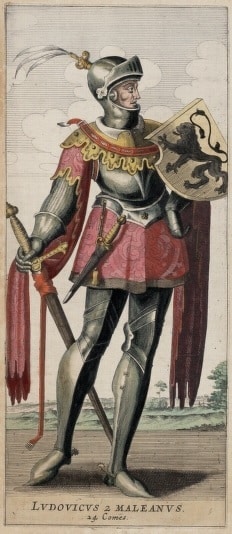 Count Lodewijk van Male (1330-1384), illustration from Flandria illustrata, 1641
Count Lodewijk van Male (1330-1384), illustration from Flandria illustrata, 1641© Wikipedia
His long-term tactics were to get key people into key positions in the big Flemish towns and to set the foundations for a more centralised administrative structure. By coupling this with a more respectful approach to the commercial interests of towns, and of the people who ran them, by the time of his daughter Margaret’s wedding in Ghent to Philip the Bold in 1369, Louis largely managed to pacify the influential power-brokers in those towns, and to temper the immense instability that had been so common across Flanders.
Philip the Bold was the fourth and youngest son of the King of France, John II. After the previous Duke of Burgundy, Philip of Rouvres, died without an heir in a horse/pneumonia related accident, John II gave the title to Philip, in order to keep it all in the family. As the ruler of Burgundy, Philip presided over a magnificent grape region, but it was mainly agricultural, and its largest city Dijon could not compare to the scope and complexities of the big Flemish cities. Although it did make delicious mustard. In ruling such a relative backwater, Philip would not gain the experience necessary to deal with the kinds of social, economic and political matters which had torn Flanders asunder so frequently.
 Illumination from the Grandes Chroniques de France showing Philip the Bold marrying Margaret of Flanders in 1369
Illumination from the Grandes Chroniques de France showing Philip the Bold marrying Margaret of Flanders in 1369© Wikipedia
In the years between 1369-79 Philip spent his time moving between his home province of Burgundy, the French court and Flanders, carefully observing the dynamics of power and learning about the area which he would rule in the future, courtesy of his wife’s inheritance. Philip would have considered the options his father-in-law, Louis de Male, had open to him in decisive matters, and also seen what kind of consequences these might have led him to. In this coming crisis, he would learn much indeed.
Alongside the king of France, Philip worked on negotiating peace terms between the English and the French in the 1370s, in an attempt to bring to an end the Hundred Years War. Since it’s known as the “Hundred Years war” and not the “Thirty Odd Years of War”, you can probably guess that he failed in these attempts. Despite this, he showed in his policies that he was already looking at Flanders’ long-term interests, by managing to broker terms that would endeavour to keep the vital English wool supply to Flanders flowing.
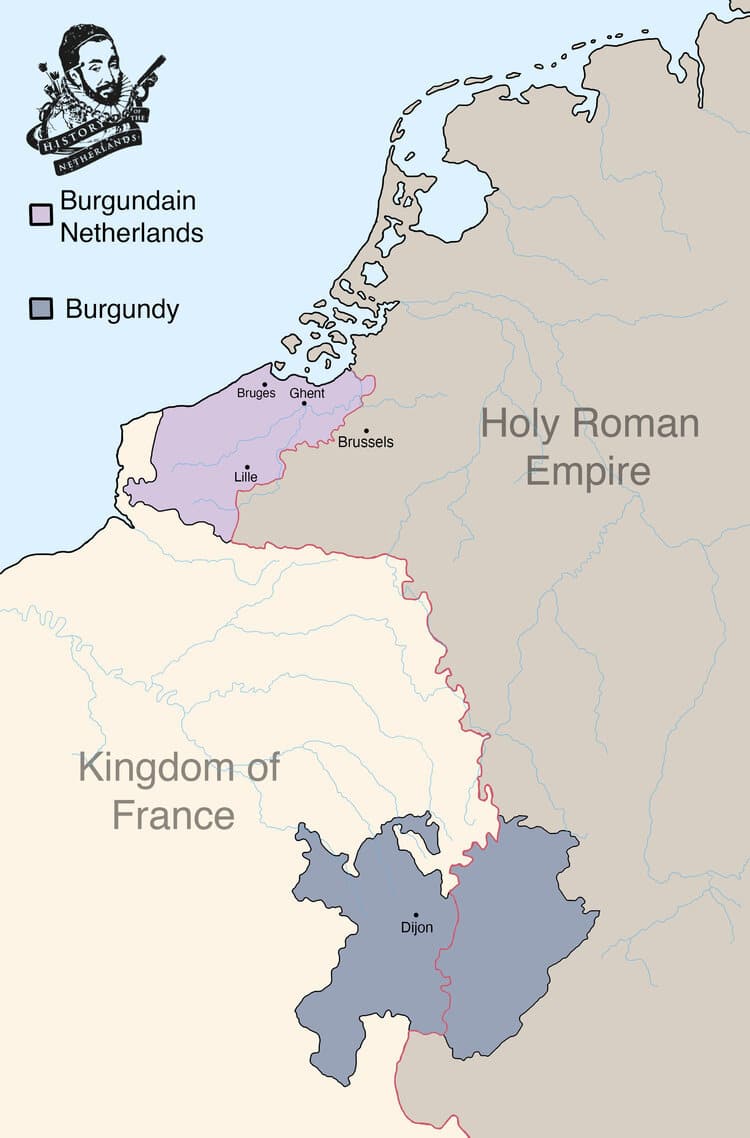
Map by David Cenzer
In this period, Philip continued to build up and nurture his network, and accrue respect from people around Europe, of whom he might later need to ask a favour. He had an eye on a future in which his father-in-law Louis de Male no longer lived, a future in which he would have primacy over Flanders. But he was astute enough to realise that he needed to garner enough popularity amongst the Flemish now, if he was going to rule them effectively later. He had to keep in mind that he was seen first and foremost as a French
prince. As we have seen over and over again, Flemish counts could not afford to be seen as puppets of France, a fact of which Philip seemed well aware.
Troublesome Ghent
Ghent never strayed too far from defying the count and was the place in which the embers of rebellion consistently smouldered. In regard to the power-structures in the big Flemish cities, it is worth reinforcing that each town had its own identity, no less in the make up of the council and institutions that ran them.
In 1379 rebellion reared its ugly head in Ghent once more. This time, the catalyst was the matter of the import of grain, and tensions arose initially between the two principal cities, Ghent and Bruges. Since the Battle of the Golden Spurs, Ghent had established a governing system which tended to see political representation by workers, especially amongst its two biggest guilds, the weavers and the fullers. Bruges, in contrast, was a major international commerce city, and power there was wielded more by the established urban elite and brokers of international finance and trade.
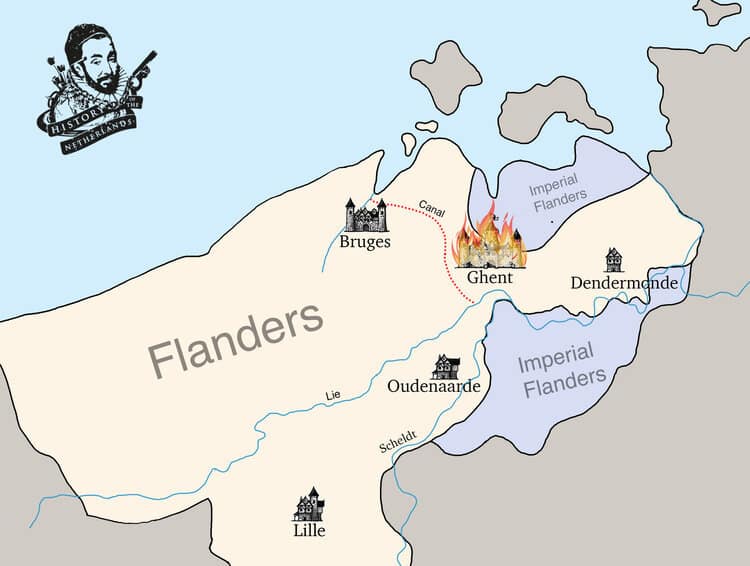 Map of Flanders in the late 14th century.
Map of Flanders in the late 14th century.Map by David Cenzer
In 1379 rebellion reared its ugly head in Ghent once more. This time, the catalyst was the matter of the import of grain, and tensions arose initially between the two principal cities, Ghent and Bruges. Since the Battle of the Golden Spurs, Ghent had established a governing system which tended to see political representation by workers, especially amongst its two biggest guilds, the weavers and the fullers. Bruges, in contrast, was a major international commerce city, and power there was wielded more by the established urban elite and brokers of international finance and trade.
Since at least 1357 Ghent had held the staple rights on all grain shipped north on the Scheldt and the Lys rivers, two of the most important trading conduits of the region. By these terms they were given first dibs on any grain coming to dock in Ghent, meaning they had a stable grain supply, and they were also able to levy import duties.
Bruges decided they would circumvent this in the most lowlander manner imaginable, by digging a canal that would bypass Ghent and connect to the Lys further south. This way grains from Hainault and Artois could be brought to Bruges without having to go through Ghent, and the Brugeois could avoid paying the staple dues. Louis de Male gave his approval to this project, further adding to the displeasure of the most easily displeasable and cantankerous citizens of Ghent.
The Bruges canal diggers fairly soon had to deal with attacks by Gentenaars, often being set upon by a Ghent militia known as the ‘white caps’, who would chase them off, kick at their stuff and shout ‘take that!’ at their fleeing backsides.
It turned out that Ghent – this insanely wealthy and populous cloth town where weavers and fullers fairly often and fairly violently took their disagreements with each other and everyone else to the streets; this city which had fostered the rebellious dictatorship of Jacob van Artevelde in the 1340s, before eventually rebelling against him as well in the form of a murderous mob – it turns out that this volatile city had not cooled down quite as much as the count and all the other cities of Flanders might have hoped. Louis de Male had over 30 years of experience dealing with the uppity cities of his domain, but even he was still prone to making moves which would only incite them to greater levels of defiance.
In retaliation to the ‘white caps’ of Ghent putting paid to the canal diggers of Bruges, Louis de Male had one of the militia leaders arrested. This was inflammatory because Ghent’s city rights meant that town citizens could only be judged in the town. Angry citizens took their revenge for this infringement on their autonomy by killing one of the count’s representatives in the town, the bailiff.
Suddenly, the violent cycle of Flemish friction was once more turning, and soon the rebellion had spread over to the other big cities as well, and most of the towns. The weavers and other workers in Bruges and Ypres and other places joined those in Ghent, and soon the nature of the conflict changed. Even though it may have started as a tussle between two towns, now it was one in which the prince was up against the rich, powerful cities. At least now Philip the Bold got to see exactly the type of social unrest that Flemish counts had to deal with, and how quickly it could spread across the territory.
Louis retains control
Allowing the cities to remain united and pushing for ever greater freedoms was obviously something which Louis could not just let happen. We must keep in mind, however, that, even though we may finally be getting out of the awful 14th century, we are still at a point where rulers and cities, what with all the different groups within them, were still trying to best figure out the terms of their relationships, that had started with the granting of city rights in the 11th and 12th centuries.
Dendermonde and Oudenaarde, two towns in strategically powerful positions on the Scheldt river, would be the key to whoever ended up with control over the river. Louis de Male managed to keep these towns loyal to him and the rebels put Oudenaarde to siege.
When this proved fruitless, a commission was formed by the end of 1379, which included representation from the three big cities of Ypres, Bruges and Gent, and which promptly banished several of the count’s men from the cities. They then chose to negotiate with the count. These negotiations were conducted by Louis de Male’s wife, and also by his son-in-law, Philip the Bold. In the resulting terms Philip showed the soft hand by which his eventual tenure would become characterised. He granted amnesty to the rebels, in return for a return to the situation prior to the outbreak. A peace was achieved, and loyalty to the count resumed across Flanders.
Except in Ghent
In Ghent the social divisions within its society, especially between weavers and fullers and other workers, and then of course the urban patriciate as well, created a tension which would have felt familiar to anyone who had been around in the 1340s. The truce did not placate many people and groups in the town, and the friction that erupted between all of them was exactly the kind of hotbed from which the brutal dictatorship of Jacob van Artevelde had risen four decades previously. All this unrest in Ghent was worrisome for the rest of Flanders, who began to inch slowly away from the most troublesome of these troublesome cities.
By 1380 the bourgeoisie and lower nobility in Flanders were pretty much all pro-Louis and anti-Ghent. Most importantly for Louis, this was firmly still the case in Oudenaarde and Dendermonde, meaning he continued to control the Scheldt.
In early 1380, however, murders that had happened during the initial violence of the rebellion were the cause of a re-sparking of conflict, and acts of revenge. This developed into a situation whereby a group of armed white-caps from Ghent attacked Oudenaarde at night, burning down its walls and gates and killing many of its nobles. They sent a message to Louis, who was in Lille, that they had just cause for this because of the murders they were avenging. Stupidly, however, after twelve days of holding Oudenaarde, they departed back to Ghent. This was stupid because, although nothing official was said, armed hostilities were now renewed, and they had just given up a tactical strongpoint for the conflict to come.
Louis returned to Oudenaarde and had the walls rebuilt. He then responded by proceeding to bleed Ghent, by blocking as many of its points of supply as possible. Although this would not show sign of success at first, it would prove effective in the long run. Especially since he still had Oudenaarde and Dendermonde and Ghent was beginning to struggle to bring goods and, particularly, food in.
The looters of Ghent
The people of Ghent, led by the captains of the city, made looting expeditions, raiding the countryside for goods whilst avoiding engaging the count’s forces. But looting was not going to cut it, especially once winter arrived. In truth it became moot to loot, people would shoot at them en route, and a lack of fruit did not suit the brutes.
Popularity began to swing against the weaver’s guild who dominated town governance, and in a risky move the council of Ghent decided that they would try to negotiate with the count, sending a delegation to Bruges to do so. This was very risky, as weavers were not at all popular in Bruges at the moment, given their tight connection with the rebellion. In the end the negotiations don’t appear to have ever happened. One source suggests that the counts demands for a peace included he be presented 500 hostages from Ghent, consisting of 300 weavers, 100 gatekeepers and 100 others from small guilds. Instead of this happening, a kind of ‘phoney’ war simply continued. Louis punished Brugeois weavers, and the Ghent rebels looted the countryside.
Rebels take Ypres
The army from Ghent moved on Ypres in April 1380. In Ypres, the weavers and the fullers had united forces in a battle that took to the streets, against a coalition of the gatekeepers and four other smaller craft guilds. During the battle the four other craft guilds changed side to the weavers and fullers, and they all took over the city. Nobles loyal to the count were slaughtered, and when the Ghent army arrived, Ypres was in control of people sympathetic to the rebellion.
The rebels had momentum, and so carried on with their army to Bruges. When they came into the city they were met by the Bruges militia, who came screaming out onto the streets, shouting the patriotic cry with which Flemish workers and their count had fought off the French at the iconic Battle of the Golden Spurs, all those years ago. Vlaanderen de Leeuw!
(Flanders the lion!)
The forces from Ghent were brutally fought off, and soon had to flee. They regrouped, however, and went in for a second attack. At this stage Louis, looking at having lost Ypres and now with Bruges in immense threat, found the magnanimity to offer a fairly good truce, which Ghent ended up accepting.
But unfortunately, the seeds of rebellion had now been sown in the minds and opinions of the weavers in Bruges, who perhaps had been rooting for the losing side in the battle for the city that had just happened. A secret meeting between the weavers took place on the 19th of August, in which it was to be decided whether or not they would rise up in rebellion against the count. The meeting was discovered, and swiftly erupted in a clash in the town between the weavers and those loyal to the count.
This unrest in Bruges would take much of the count’s attention during the latter half of 1380, a period in which the weavers were cut down, and suppressive policies were enforced immediately afterwards, such as banning weavers from carrying weapons, making all new members of the weaver’s guild in Bruges swear oaths of loyalty to the count (at pain of death) and also banning weaver’s participation in the city council.
With Bruges kept out of their grasp, around 3000 of the rebels left, formed a fighting force for the rebellion, and went off to Ypres where their contemporaries were still in charge.
The count sent a large army against the forces of Ghent, largely inflicting defeat and causing them to flee once more to their own city. Pretty soon, Ypres was basically just open to the count to take it back, which was helped by people in the city opening its gates for his arrival, and scores of them standing outside as he entered and shouting how much they had wanted to remain loyal to him, but had been forced into treason by those blighted weavers. The count, now once more in charge of all of Flanders except Ghent, took hostages from Ypres, mainly weavers, and then left to go and organise a proper siege of that most troublesome city of his, that would bring it to its knees once and for all.
The rise of Artevelde 2
The winter of 1381-82 really began to bite then for the people of Ghent. Morale was extremely low and getting lower, probably at the same rate as the food supply. Many of the captains of the militia had, by now, been killed in forays against the count’s forces. The leading man in the city, named Pieter van den Bosch, decided to take a drastic and hugely symbolic measure, to try to bring some sense of unity to this faltering rebellion.
He convinced the weavers guild and the ruling council to get behind a man who, by the force of his very name, might well be able to lead Ghent to victory in this defiance against the tyranny of Louis de Male; a man called Philip van Artevelde. We know this name, because he was the son of that terrifying character, the Brewer of Ghent, Jacob van Artevelde, who had reigned supreme over Flanders some 40 years earlier.
The younger Artevelde was appointed as the Ruwaard, swearing the oath on the 24th of January, 1382, and his government consisted of representation from the same three groups from which the Count had demanded hostages. This shows that, although there was factionalisation and a lot of division in Ghent, it seems that there were at least elements in each of the main groups that supported this rebellion.
This appointment drew a direct connection to the past of Flanders, in a way that was designed to evoke regional and city pride. It reminded everyone that the rule of Jacob van Artevelde had literally forced the Count of Flanders out of the county and created an autonomy for Flanders that was upheld by pro-commerce and pro-English policies, which is what most people just wanted anyway. But the naming Philip van Artevelde as the new head captain of Ghent also stirred up a cultural and patriotic passion linked with things like the Battle of the Golden Spurs, and the rising power of craft guilds, which had so served to give workers and Flemings a collective and parochial pride.
Well, that was the idea anyway. Unfortunately Philip proved to be as big a psychopath as his father was, according to the medieval chronicler Jean Froissart, anyway. The younger Artevelde began a witch hunt that took revenge on people complicit in his father’s lynching, as well as against those who had tried to negotiate peace with the count in the previous year. Believe it or not, 40 years after the last one, once again an Artevelde dictatorship had arisen in Ghent.
Ghent struggling for provisions
As well as carrying out political assassinations, more captains in Ghent were charged by Artevelde with finding reliable food sources, looting was proving untenable. Ghent still had access to a few ports in Imperial Flanders, in an area known as the Vier Ambachten. Expeditions were sent into eastern Flanders and to Brabant, and up to Holland and Zeeland to search for provisions, both by water and over land. Via streams and tributaries these would be able to be brought back to the city.
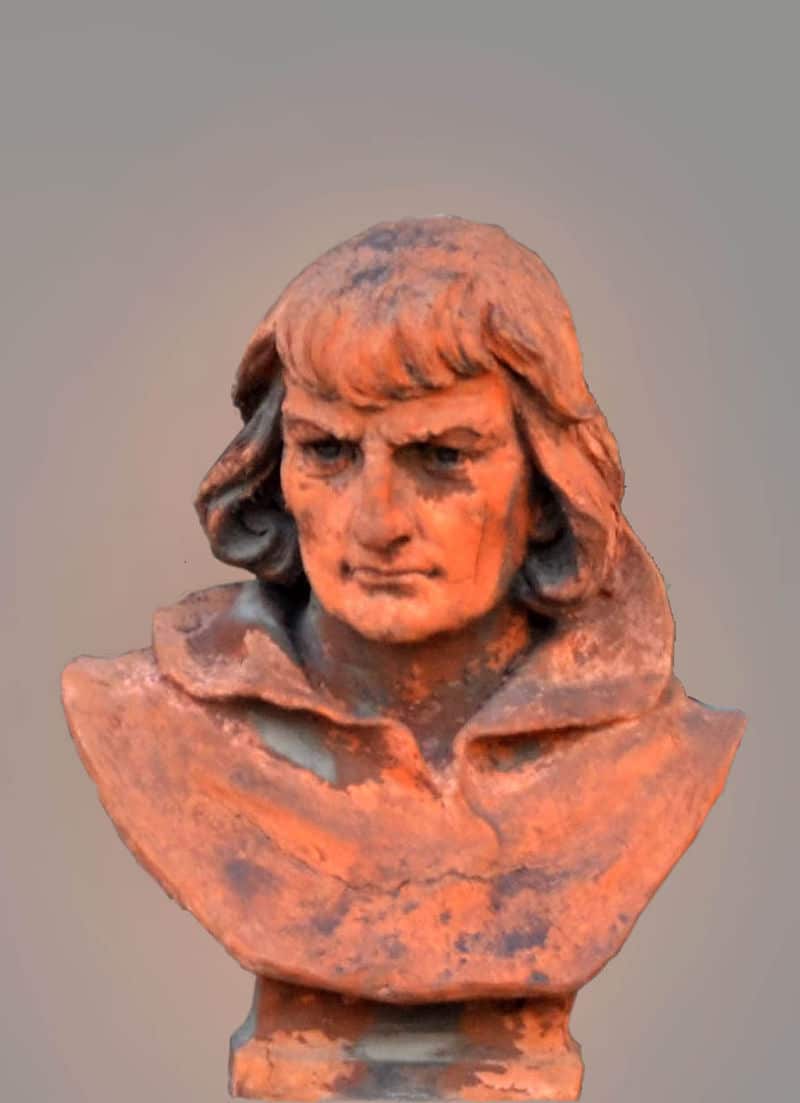 Frans Ackerman, rebel leader of ghent
Frans Ackerman, rebel leader of ghent© Wikipedia
One captain, Frans Ackerman, was fairly successful. He took an army east and received ample food in cities like Leuven, Brussels and also in Liege. He made an approach to the Duchess of Brabant, Johanna, asking if she would help organise negotiations with Louis again, which she did, arranging a conference in Tournai in March.
At these negotiations, however, Louis was now implacable. He was fed up with all these broken peaces and rebellious intent, so denied all requests by Ghent’s representatives, and instead took measures to further isolate the city. His forces then managed to ambush and destroy the food caravan that Ackerman had managed to arrange, as it was moving from Brabant to Ghent. This would have been devastating news which would have made a bunch of expectant and hangry people in Ghent, even hangrier.
Looting the countryside and garnering meagre provisions brought down streams and secretly stowed in carts rattling on the roads from the Vier Ambachten were options that, by early to mid 1382, had basically run-dry. Artevelde could see in Ghent that support for the uprising and his government was teetering. He needed food and he needed a military victory, so these things are what he set out to achieve.
Attack on Bruges
In an outrageous and bold move on the 3rd of May in 1382, Artevelde the younger led a sortie to try and take the Brugeois by surprise whilst they were distracted by a religious celebration: the procession of the Holy Blood; a relic for which Bruges was, and still is, famous.
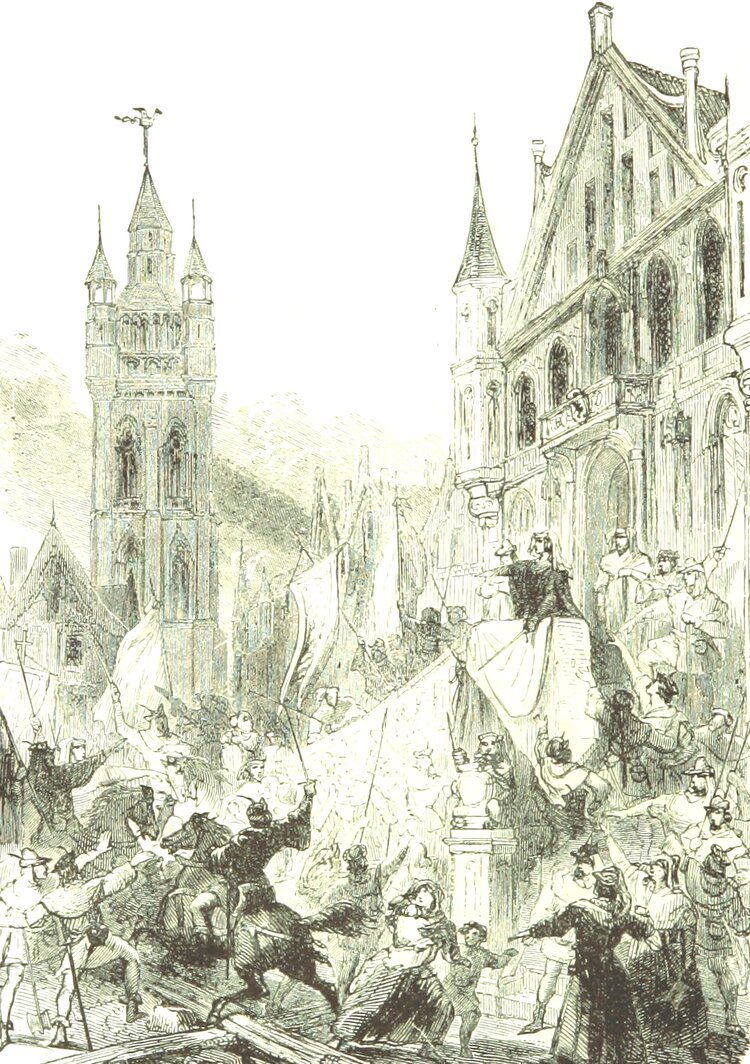 Philip van Artevelde calls the Gentenaars to attack Bruges, image taken from: "Geïllustreerde geschiedenis van België”, 1885
Philip van Artevelde calls the Gentenaars to attack Bruges, image taken from: "Geïllustreerde geschiedenis van België”, 1885© Wikipedia
The count’s forces and the Bruges militia were able to mobilise quickly enough to meet the oncoming Gentenars in battle, at Beverhoutsveld, just south of Bruges’ walls. Whether through hunger, desperation or the inspired leadership of their murderous leader, Ghent’s troops managed to push their opponents back towards their own town. A rout ensued, and the Gentenaars descended upon Bruges, and cut down the fleeing Brugeois. Louis de Male himself was even there, and when he was seen, Artevelde screamed at his men that they must not kill the count, but imprison him so they could force peace terms on him. But these were hangry workers. A group of blacksmiths surrounded the count, and he only just narrowly escaped being butchered. A cartwright who was still loyal to him managed to hide him, however, and secretly escorted him to safety in Lille.
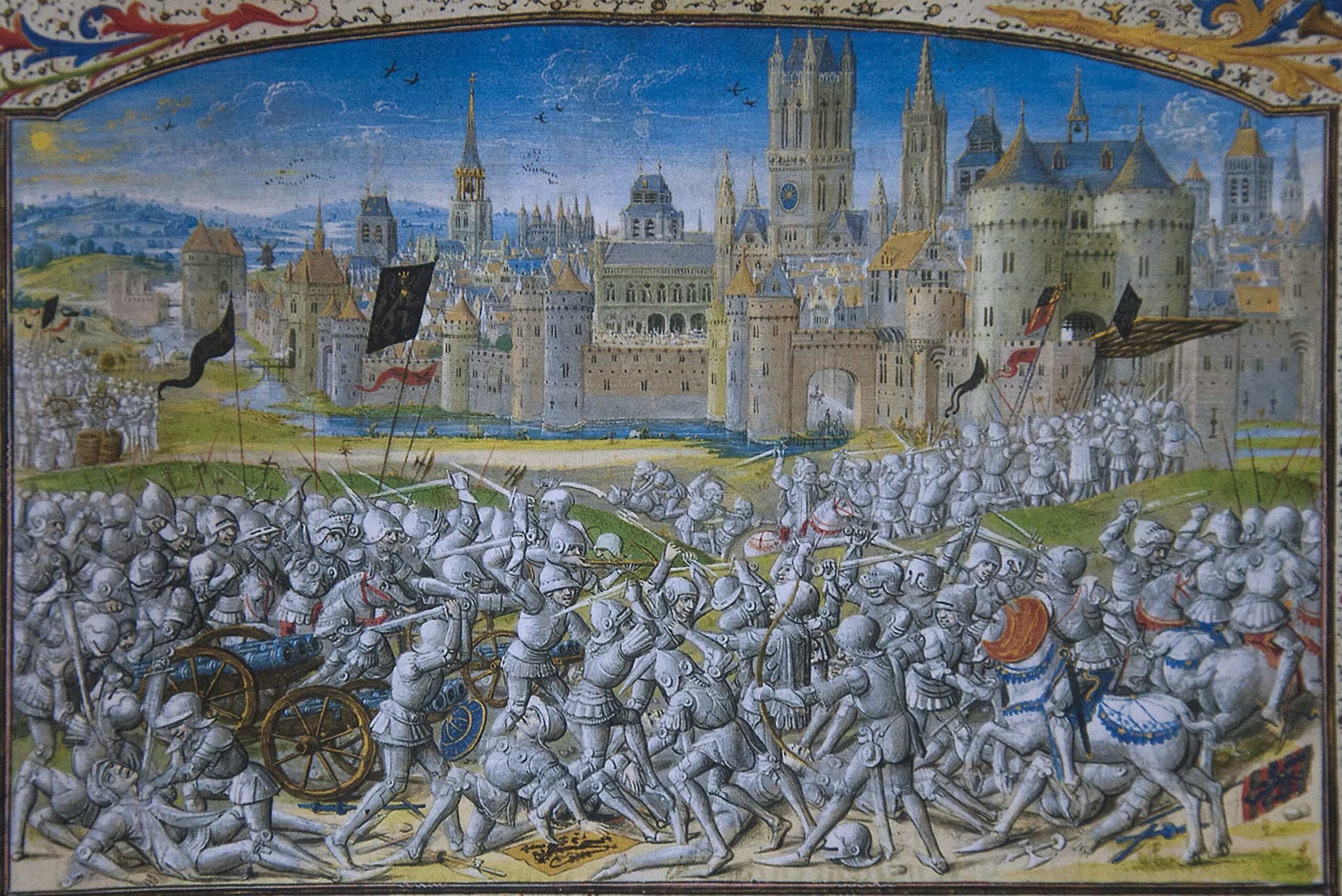 The Battle of Beverhoutsveld, image taken from Chronique de Froissart, 15th century, Berlin Staatsbibliothek
The Battle of Beverhoutsveld, image taken from Chronique de Froissart, 15th century, Berlin Staatsbibliothek© Wikipedia
Artevelde and the Gentenaars were able to take over Bruges, which they would hold for six months. Immediately the tables of power turned in the town again, as those who had punished the rebels the year before now came to suffer. Certain prominent people and members of particular families were murdered, and any one else loyal to the count was under threat of their lives. Small craft members and, of course, the weavers of Bruges were now put into positions of power, for example as new city captains.
Traditionally in Bruges, which was dominated by the patrician class, the small craft workers had held far less sway than their contemporaries in Ghent, who were at the forefront of this rebellion and for whom this was about political power. For the Brugeois weavers and other small craft workers, this struggle was a social and economic one, perhaps one that might grant them the freedoms that had been promised 80 years prior in the Battle of the Golden Spurs, but which as yet had not been delivered to them in their city. This distinction also goes to show how, even though we are talking about towns not very far from each other and with similar economic foundations, there was still such a difference in how their socio-political structures had developed over this whole crazy period of early urbanisation and commerce.
In Bruges, the now ruling rebels made clear to foreign merchants, and in particular to the Hanseatic merchants in the town, that they would remain unviolated in the continued pursuit of their business. The main concern for the rebels in Ghent was getting food in to Ghent, but for those rebels now in charge of Bruges, keeping trade lines open, and especially the important wool trade with England, was top priority. Letters from Hanseatic merchants relay that they were not molested and were encouraged to keep business running.
Louis bleed the rebels
It appears that Louis was well aware that the notion of a Flemish identity mattered now. His Frenchness, as well as that of his son-in-law Philip the Bold, would serve them poorly if they were to try to capture the hearts and minds of the Flemish and quash the rebellion. Therefore he enlisted the help of a high-ranking Fleming, van Halewijn, and ordered him to Oudenaarde to fortify it against the entreaties of the rebels. In this he succeeded. Oudenaarde remained loyal to Louis. Philip van Artevelde, hearing of this, called for the entirety of the Flemish workforce to lay Oudenaarde to siege, which many people promptly set about doing.
Having momentum, Artevelde and/or the rebel leaders then made a weird decision. Froissart tells us that a force of around 12000 men was put together, and made their way into France to sack small French villages and cities. This, if true, was also extremely stupid. Because as always the biggest threat to rebellions and pushes for autonomy in Flanders was that the French king would get involved and send or even personally lead his a French army to invade. There were few greater guarantees to making this happen, than by going and raiding French villages.
The French king at this moment was a young boy, and French rule was in the hands of a council that consisted of four French nobles. The most dominant of these, loosely speaking, was the king’s uncle who, and you’re never going to believe this, was our man, the son-in-law of Louis of Male and, for all intents and purposes, his successor apparent in Flanders, Philip the Bold.
At this juncture Philip found himself in a position to determine the future of Flanders. All accounts of his character and intelligence suggests that he was aware of this. The action he took also suggests that he knew what he was doing.
French prince is the heir
Philip had, by now, been working with his father-in-law for over a decade, learning about the complexities of how Flanders ran, seeing how Louis of Male went about trying to centralise power, and how he managed the constant struggles of social and economic balance and political power between himself, the towns, the workers, whilst factoring in the demands of the English and Hanseatic trade connections and the sovereignty of the French king on top of it all. Now Philip had seen what happened when a crisis hit, and could show what, if anything, he had learned from seeing and being a part of how his father-in-law had dealt with it thus far.
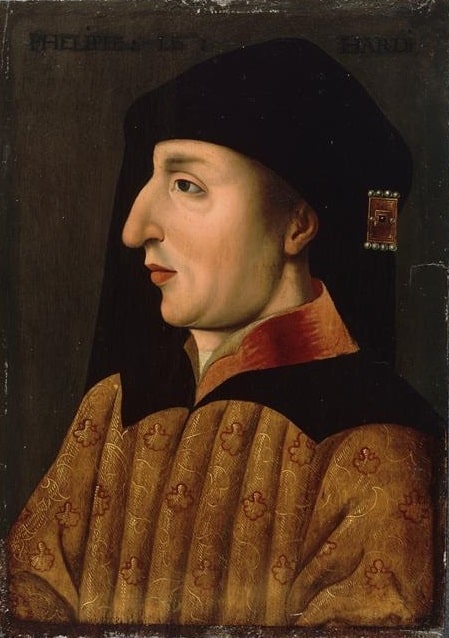 Philip the Bold, unknown artist (Flemish school). 16th century, Hospice Comtesse, Lille
Philip the Bold, unknown artist (Flemish school). 16th century, Hospice Comtesse, Lille© Wikipedia
Whether the French landed a force in Flanders was essentially his decision, as was the manner in which he took it. Perhaps he could do it in a way that brought Flanders well and truly back under full, French control, much as had been attempted earlier in the century. This could have spelled the end of over a century of Flemish rebellion and maintenance of its own autonomy. Just as similarly, any French intervention could lead to another Battle of the Golden Spurs, wherein the Flemish workers prevailed against French knights. If this happened, how then would Philip hold on to any decent reputation that remained afterwards? He would be humiliated.
Philip made a smart move. He made noises in the French court about the need for French troops, so as to bring Flanders more under French rule, essentially what the power brokers in France sought. But then he got his father-in-law to actually request the French troops directly from the king, his nephew. By not requesting them himself, Philip kept himself in a position that could be seen as respectful of the autonomy of Flanders, and not just acting as a power-hungry french prince.
French Connection
The French army invaded in November 1382, led by the King himself, as well as the Dukes of Burgundy, Anjou, Bourbon and Berry, who were the four blokes actually running France. The united will of the Flemish in rebellion was not as strong as the fear of this force, and people began to turn against the weavers and other workers, who had been the main provocateurs in the whole rebellion; especially those from Ghent. As word spread through the county, morale for defiance broke down. Artevelde had a lot of work in front of him convincing people to stay strong.
He gathered all his forces and made his way to Kortrijk, and Westrozebeke, nearby where the famous Battle of the Golden Spurs had taken place almost exactly 80 years previously. Once more Flemish workers were going to fight French knights.
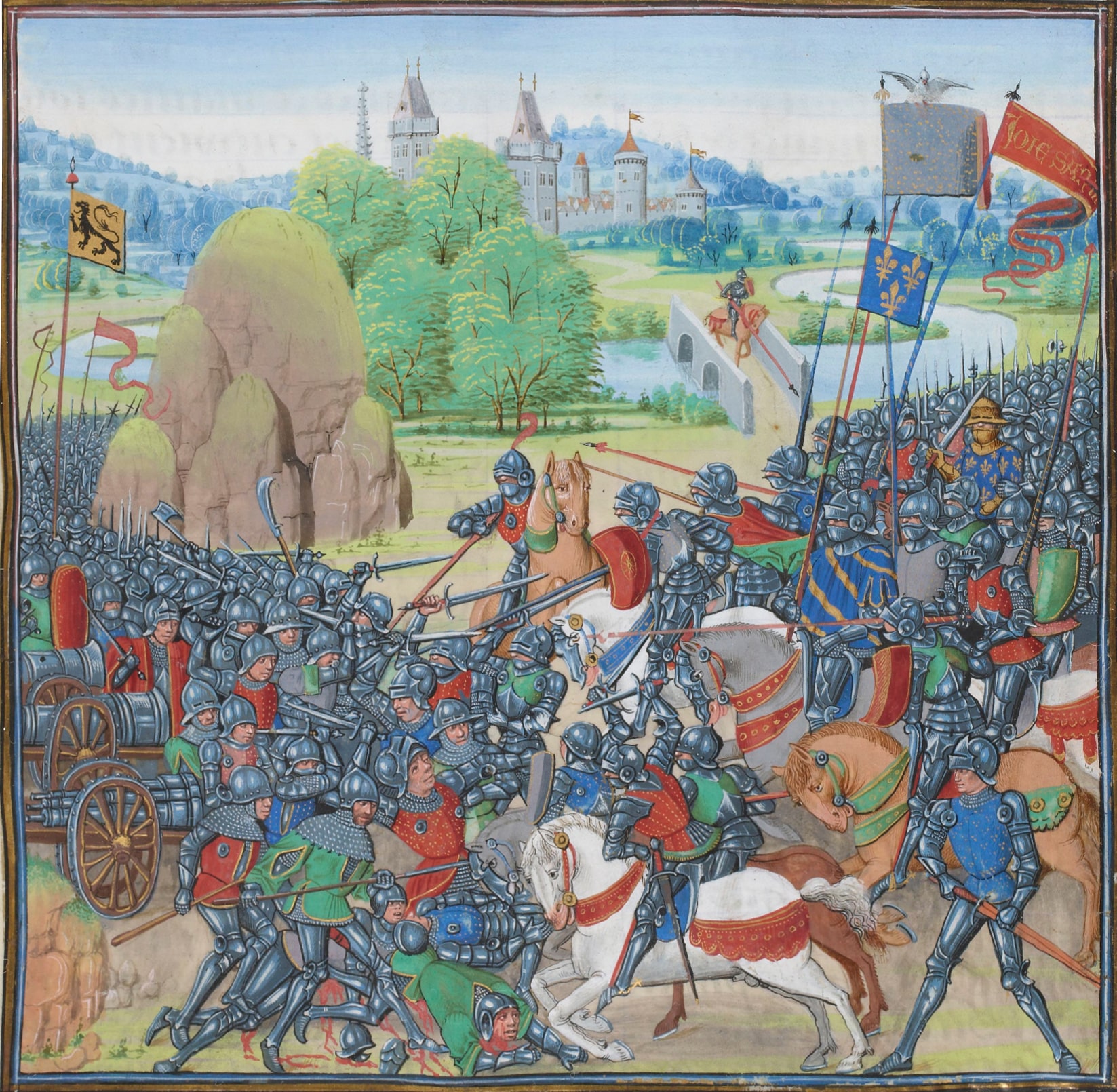 Battle of Westrozebeke, image taken from Chronique de Froissart, 15th century, Berlin Staatsbibliothek
Battle of Westrozebeke, image taken from Chronique de Froissart, 15th century, Berlin Staatsbibliothek© Wikipedia
On the 27th of November the forces met, and the French absolutely destroyed the Flemish rebels. Artevelde himself was killed, and it was a complete rout. Following the battle, a panic hit Bruges. Many people who were uncertain whether they would now be included in the reckoning of the rebels packed up their stuff and fled, either to Ghent, or to Holland and Zeeland. A man called Christoffels van Scoten appeared in Bruges’ main market square, escorted by members of the clergy holding aloft their big crosses and lit-torches. People began to gather around them, and pretty soon the cry went out Vlaanderen de leeuw! (Flanders the lion!). Bruges was well and truly back in the count’s hands.
When the punishment came for the rebellion in Bruges, records tell us that 281 people in Bruges had their things confiscated and 45 of them were weavers, the largest, single group targeted for reprisals. The regime installed in the city by the count after this would last for nearly 25 years, and their policies would aim to prevent the weavers or their ilk getting power again.
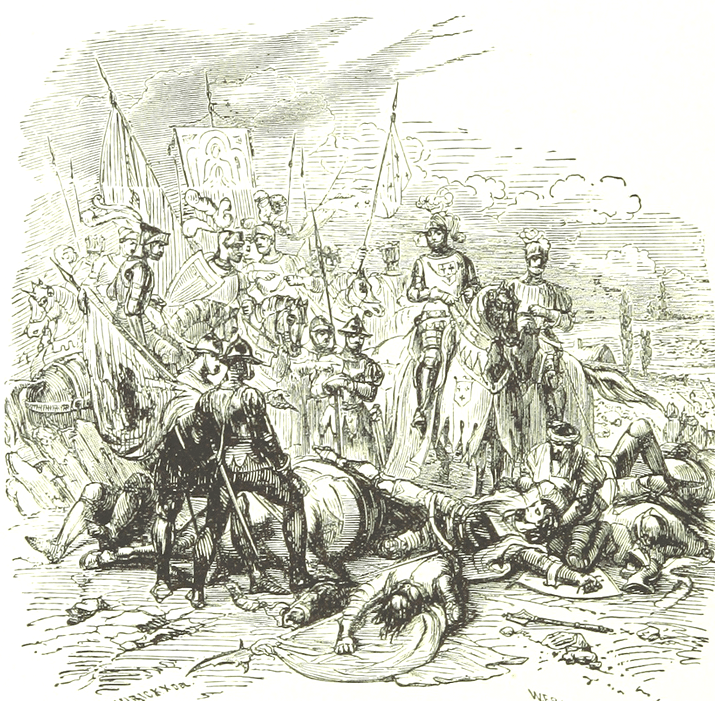 The dead body of Philip van Artevelde at the Battle of Westrozebeke in 1382, image taken from: "Geïllustreerde geschiedenis van België”, 1885
The dead body of Philip van Artevelde at the Battle of Westrozebeke in 1382, image taken from: "Geïllustreerde geschiedenis van België”, 1885© Wikipedia
Word of the victory by the count’s forces and his allies the French spread like wildfire, and quickly all towns and villages across the county shook off their association with the rebels and began to turn in those who would take the blame. It turns out that the support for the rebellion in the rest of Flanders was based on the fear of Ghent, and what it had done to Bruges, rather than the social, economic and political aims of the workers.
Rise, Philip the Bold
So now Ghent stood alone. Its gates were closed and the city was once more surrounded. Thus it would remain for another two and a bit years. In 1384 the rebel city would get a small bit of satisfaction, no doubt, from the death of Louis of Male. The old Flemish count who, during the tumult of the 14th century, had done perhaps better than any other in trying to balance this petroleum doused snakepit that was Flanders, left this responsibility to his daughter Margaret. Alongside Flanders, she received the counties of Nevers, Rethel, Artois and Imperial Burgundy. Louis was also the last male Dampierre ruler of Flanders; the line of Flemish counts that had stemmed from Guy of Dampierre who, all those years ago had taken action against the French king to instil a rebellious sense of identity into his Flemish people, now ended with a count whose struggle, in the end, relied on the French crown to put down such Flemish rebellion.
Even though Margaret was now the countess, and it is tragic how little information there is about what role she played in the administration of her territories, her husband was now the count, and so gets significantly more of history’s attention than she does. With the death of Louis of Male, all of a sudden the man who was the de facto ruler of France, being that he dominated the regency council in France, also became the de facto ruler of most of the southern lowlands. Philip the Bold took control of this situation in an extremely intelligent and political fashion, and aptly managed to meet the demands of ruling Flanders with the demands of the French court, all whilst maintaining rule in his own, wine-producing Duchy of Burgundy.
In the Low Countries he showed what he had learned from his father-in-law and from the whole chaos of the Ghent War, which he now had to bring to an end. In 1385 he negotiated a peace with Ghent, the Peace of Tournai, in which Ghent kept its city privileges and the rebels received amnesty. If we compare this to Louis’ demands of 500 hostages at the start of the war, we see the lessons of leniency being displayed by the new Flemish count. In return for this, the rebels in Ghent had to suspend any treaty with the King of England and re-new their loyalty to the French crown.
And this is what set Philip apart from all those other counts before. Philip showed better political tact. The ordered suspension of a treaty with England was more as a concession to the pride of the French king than as firm policy. In 1387 he turned a blind eye to Flemish merchants who made their own private trade deals with English traders. Philip, not at all Flemish himself, still seemed to understand better than any Flemish ruler before him where his bread was buttered when it came to the territory.
Now Philip was positioned to further expand his power. He had been schooled in the pitfalls of ruling Flanders, and through other methods he would begin to add more territories to his dominion. The rebellious nature of the Flemish cities would not disappear, and future Dukes of Burgundy would have to deal with them again. But while the 14th century would be remembered for its chaos and terror, the 15th century would be remembered for growth, wealth and relative stability. And why was that? Because of how Philip set up his system of governance.
Sources
- ‘Een onderzoek naar de rol van de Brugse wevers in de Gentse opstand (1379-1385)
by Pieterjan Vanhoutte - Magnanimous Dukes and Rising States: The Unification of the Burgundian Netherlands, 1380-1480 by Robert Stein
- The Chronicles of Froissart – Translated by John Bourchier, Lord Berners, edited and reduced into one volume by G. C. Macaulay
- The Scheldt trade and the ‘Ghent War’ 1379-85 by David Nicholas
- A History of the Low Countries by Paul Arblaster
- The Promised Lands by Wim Blockmans and Walter Prevenier
- The Chronicle Attributed to ‘Olivier van Diksmuide’: a Misunderstood Town Chronicle of Ypres from Late Medieval Flanders


